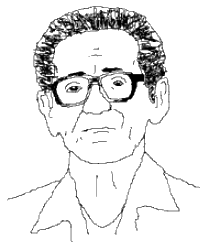
Benjamin Libet’s famous experiments have been among the most-discussed topics of neuroscience for many years. Libet’s experiments asked a subject to move their hand at a random moment of their choosing; he showed that the decision to move could be predicted on the basis of a ‘readiness potential’ detectable half a second before the subject reported having made the decision. The result has been confirmed many times since, and even longer gaps between prediction and reported decision have been claimed. The results are controversial because they seem to be strong scientific evidence against free will. If the decision had been made before the decider knew it, how could their conscious thought have been effective? My original account (14 years ago, good grief) is here.
Libet’s findings and their significance have been much disputed philosophically, but a new study reported here credibly suggests that the readiness potential (RP) or Bereitschaftspotential has been misunderstood all along.
In essence the RP is a peak of neural activity, which seemed to the original researchers to represent a sort of gathering of neural resources as the precursor of an action. But the new study suggests that this appearance is largely an artefact of the methods used to analyse the data, and that the RP really represents nothing more than the kind of regular peak which occurs naturally in any system with a lot of background noise. Neural activity just does ebb and flow like that for no particular reason.
That is not to say that the RP was completely irrelevant to the behaviour of Libet’s subjects. In the rather peculiar circumstances of the original experiment, where subjects are asked to pick a time at random, it is likely that a chance peak of activity would tip the balance for the unmotivated decision. But that doesn’t make it either the decision itself or the required cause of a decision. Outside the rather strange conditions of the experiment, it has no particular role. Perhaps most tellingly, when the original experiments were repeated with a second group of subjects who were asked not to move at all, it was impossible to tell the difference between the patterns of neural activity recorded; a real difference appeared only at the time the subjects in the first group reported having made a decision.
This certainly seems to change things, though it should be noted that Libet himself was aware that the RP could be consciously ‘over-ruled’, a phenomenon he called ‘Free Won’t’. It can, indeed, be argued that the significance of the results was always slightly overstated. We always knew that there must be neural precursors of any given decision, if not so neatly identifiable as the RP. So long as we believe the world is governed by determined physical laws (something I think it’s metaphysically difficult to deny) the problem of Free Will still arises; indeed, essentially the same problem was kicked around for centuries in forms that relied on divine predestination or simple logical fatalism rather than science.
Nevertheless, it looks as though our minds work the way they seem to do rather more than we’ve recently believed. I’m not quite sure whether that’s disappointing or comforting.
